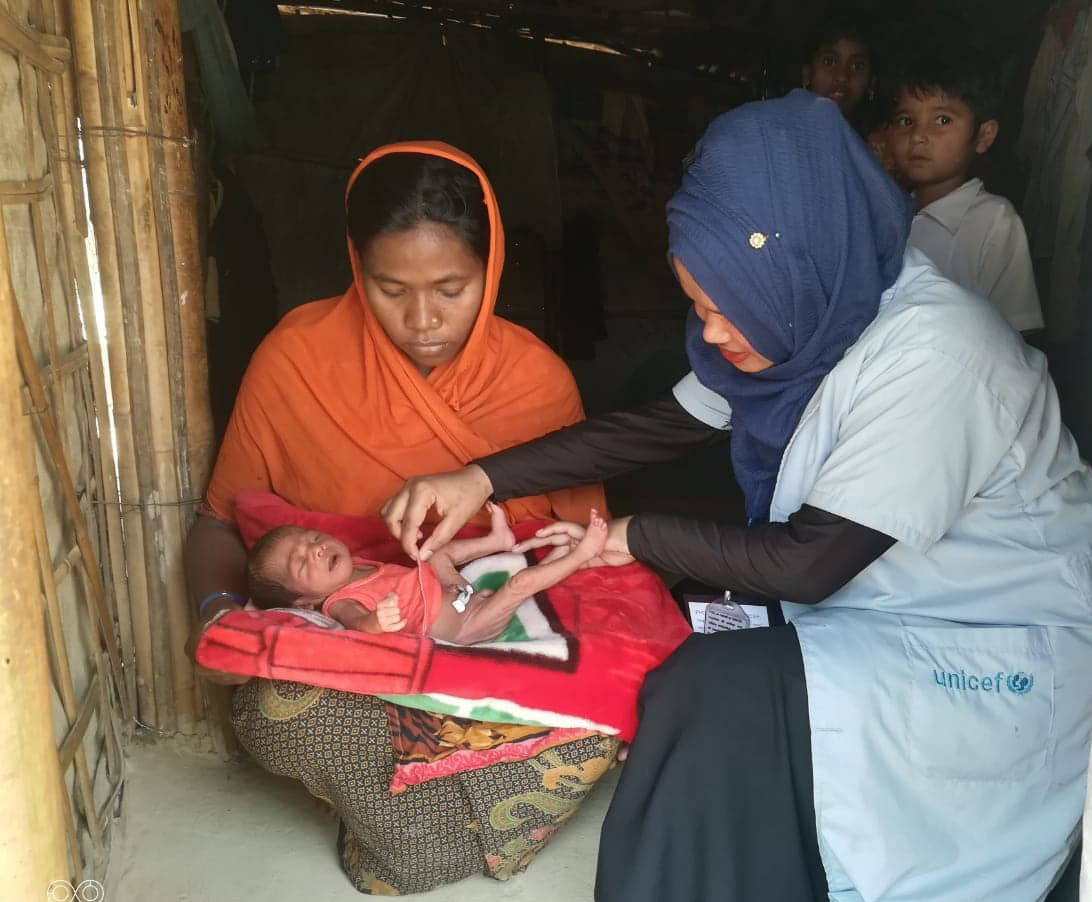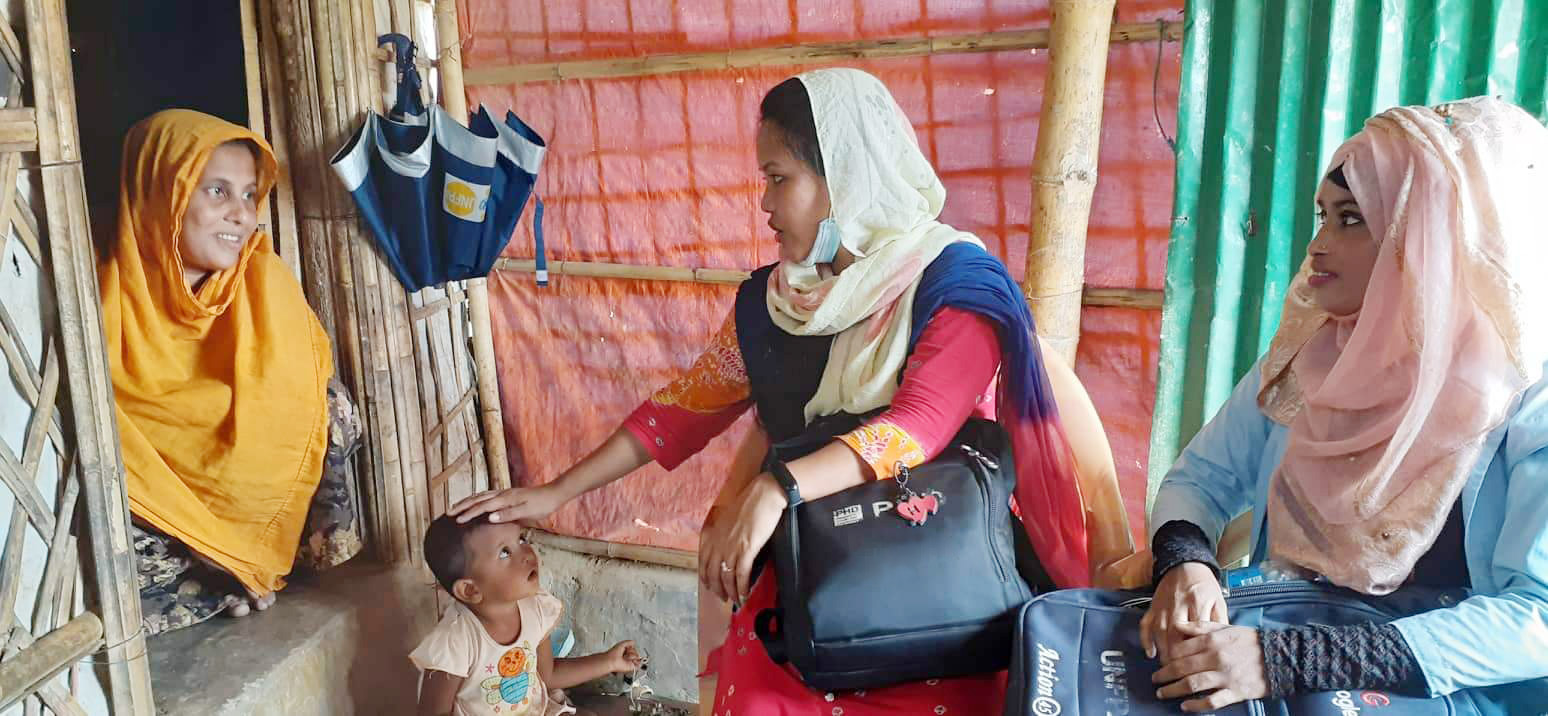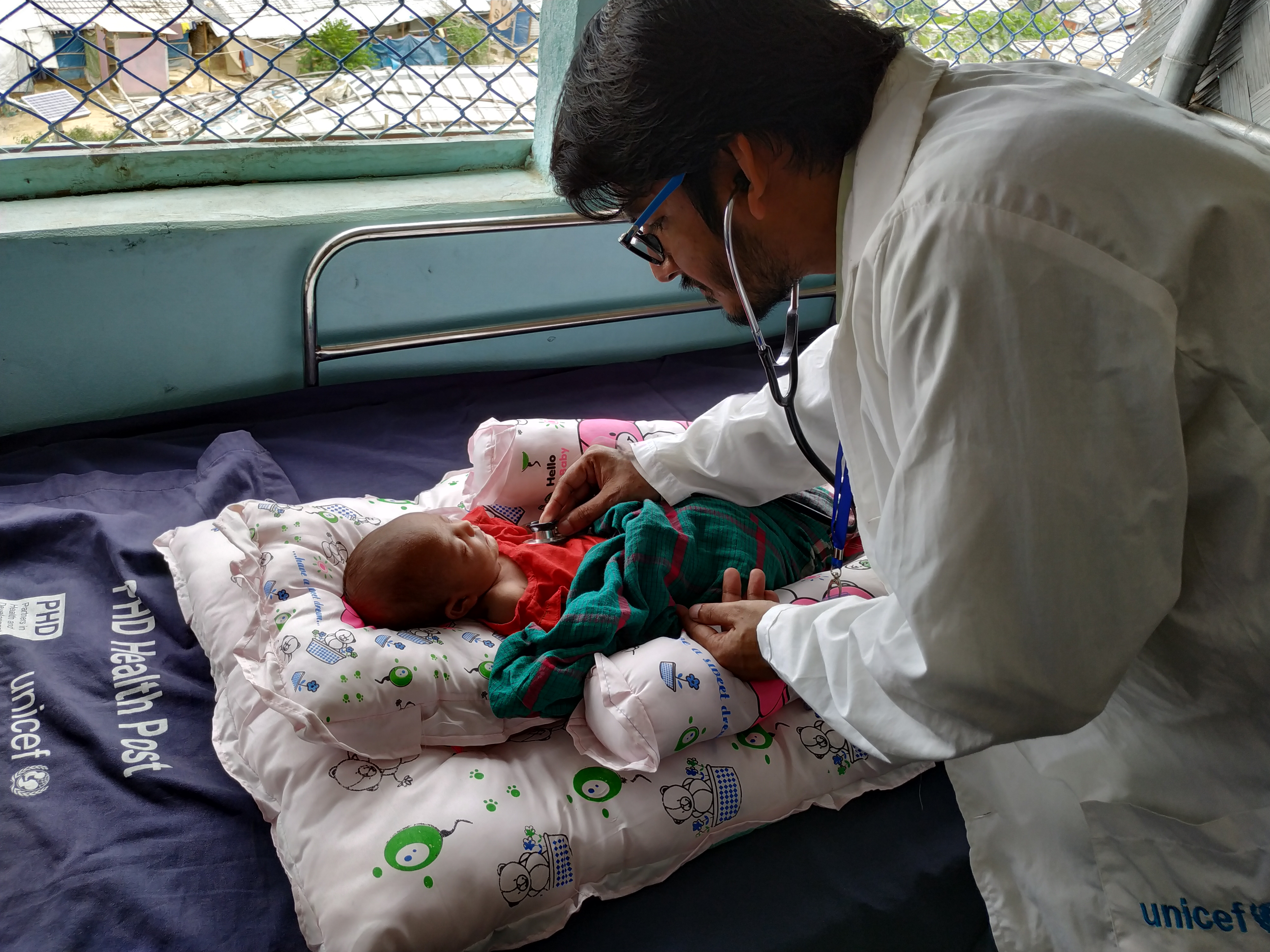|
Project Title: Nutrition Interventions for vulnerable Rohingya and Host Communities in Cox’s Bazaar, in particular Children Under five, Adolescents, Pregnant and Lactating women
Coverage of Areas: Camp 10, Camp 12 and Camp 18 at Ukhiya Upazila
Coverage of Health Facilities: Primary Healthcare Centre (PHC) 096 at Camp 10, Health Post (HP) 117 at Camp 12, Health Post (HP) 183 at Camp 18
Donor : World Bank through UNICEF Bangladesh
Duration: 26 Months (15 January 2020 to 28 February 2022)
Population focus: Under 5 Children, Adolescent boys and girls, Pregnant Women, Lactating Mothers and Caregivers |
Since September 2017, PHD has been operating nine health facilities in different camps of Ukhiya Upazila jointly with the Health Section of UNICEF Field Office in Cox’s Bazaar. PHD delivers day-time Out-patients’ Maternal Neonatal Child and Adolescent Health (MNCAH) Services through seven Health Posts (HPs), and 24/7 In-patients’ and Out-patients’ MNCAH Services through two Primary Healthcare Centres (PHCs). Out of the nine health facilities, two HPs and one PHC are supported through a grant from the World Bank. Under a collaborative arrangement with the Nutrition Section of UNICEF Field Office in Cox’s Bazaar, in these 3 World Bank funded health facilities PHD implements nutrition interventions in line with the National Nutrition Service Operational Plan (NNS-OP), particularly for improving Maternal, Infant and Young Child Feeding (M-IYCF) practices. Objective Objective of the integrated Nutrition Intervention is to reduce burden of malnutrition among Under 5 Children, Adolescent Boys, Adolescent Girls, Pregnant Women, Lactating Mothers and other vulnerable groups through strengthening and scaling-up of malnutrition prevention interventions Expected Outputs
Key Interventions
|
|
Project Title- Community Based Maternal, Neonatal Sexual & Reproductive Health Program for the Rohingya & Host Community, Cox’s Bazar.
Coverage of Areas - Total 22 camps and 5 Unions in Ukhiya and Teknaf Upazilla.
Donor - UNFPA Bangladesh with multi-donor support
Duration - July 2018 to December 2025
Population focus- Pregnant Women, Lactating Mothers and Caregivers, Adolescents Girls, , Under 5 Children and others. |
The Rohingya population after the last recent influx since August 2017 became about 1 million; of which 52 percent comprises of women and girls and 55-60 percent is children. There has been a serious lacking of knowledge regarding their sexual and reproductive health rights and information among this community people, found by humanitarian organizations. And also found that the likelihood of death for the women and children is 14 times higher than a man. With immense previous experience working with Rohingya community on the Maternal, Newborn Sexual and Reproductive Health Program issues and the vast experience in community mobilization in the crisis-affected community on their rights to health, especially SRHR etc. made PHD a major actor in this project. PHD holds the highest number of CHWs (350) and largest working areas, approximately 30% of the population in the camp and host community in Ukhiya & Teknaf sub-district. These PHD-CHWs visit around 4200 houses every day. Their visits include communicating health messages and refer pregnant mothers for ANC, delivery, PNC to the nearby facilities. They also counsel for facility delivery, maternal and neonatal care, family planning, GBV, CMR, STI/RTI, adolescence by PHD.
|
|
Project Title- Provision of Comprehensive Primary Health Care Services to Rohingya Refugees in Cox’s Bazar
Area Coverage- 8 Rohingya Camps at Ukhiya Upazila of Cox’s Bazar District
Health Facility Coverage- Three (3) Primary Healthcare Centre (PHC)- i) 071 at Camp 8W and ii) 096 at Camp 10. Six (6) Health Post (HP)- i) 117 at Camp 12, ii) 183 at Camp 18, iii) 033 at Camp 3, iv) 032 at Camp 4, v) 134 at Camp 13, and vi) 165 at Camp 16 Joint Collaboration- UNICEF Bangladesh with support of multi-donor agencies
Duration- Phase 1- 12 Months (16 September 2017 to 15 September 2019) Phase 2- 20.5 Months (16 September 2019 to 31 May 2020) Phase 3 - 7 Months (May 2020 to December 2020) Phase 4 - 12 Months (January 2021 to December 2021) Phase 5 - 12 Months (January 2022 to December 2022) Phase 6 - 12 Months (January 2023 to December 2023) Phase 7 - 12 Months (January 2024 to December 2024)
Population focus- Women, New-borns, Under 5 Children and Adolescents |
Since 25th August 2017, targeted violence against Rohingya communities forced them to flee from their homes in Rakhine State of Myanmar. Around 671,000 Forcibly Displaced Myanmar Nationals (FDMN) crossed the border and sought safety in our country. The People of Bangladesh and the Government expressed resounding solidarity with these people. The situation incurred Heath Sector for immediate response with emergency Primary Health Care including SRH, MNCH Care, and Outbreak Preparedness. The collaboration between UNICEF and PHD initiated a response in line with the Joint Humanitarian Response Plan. Joint response to new Rohingya Settlements for MNCAH Services has three key components, i) Out-patients’ Services, ii) In-patients’ Services, and iii) Community Health Interventions.
Objective According to the Country Program Document (CPD) Output 1, UNICEF has committed to strengthen the quality of integrated service delivery and effective coverage in national and subnational health systems to support the well-being of children under 5 years and their mothers. It also includes people infected and affected by HIV, emergency and non-emergency situations in both rural and urban areas. The joint response has been intended for the emergency situation in Cox’s Bazar to provide life-saving basic assistance in Rohingya Camps. Expected Outputs
Key Interventions Component 1- Day-time Out-patients’ Service Delivery in HPs PHD operates 6 HPs with adequate numbers of skilled workforces to deliver the following services-
Component 2- Out-patients’ and In-patients’ Service Delivery in PHCs PHD operates 2 PHCs with adequate numbers of skilled workforces to deliver the following services-
Component 3- Community Health Interventions at Camps PHD engages 10 Community Health Workers (CHWs) per HP and 25 CHWs per PHC under the guidance of 5 Supervisors for promoting MNCH care at home and improving MNCAH care seeking behaviours among the targeted population through following interventions-
|



